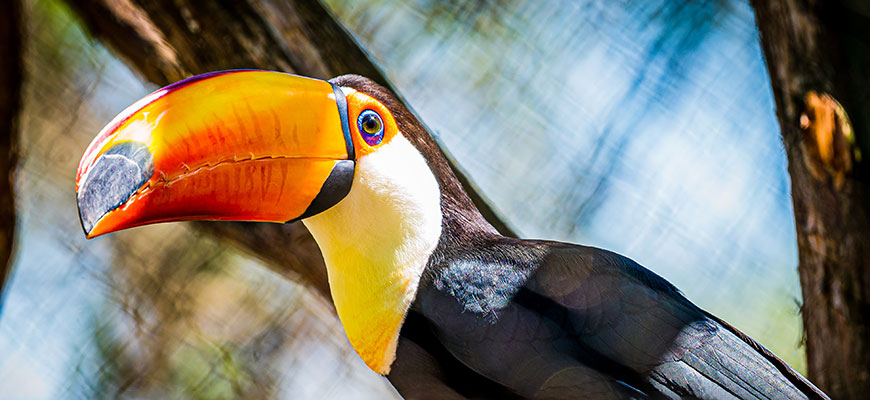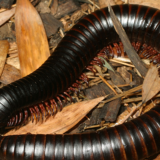CLASSIFICATION
Order: Piciformes
Family: Ramphastidae
Genus: Ramphastos
Species: R. toco
RANGE
South America; primarily in countries like Brazil, Suriname, Guyana, Bolivia and Paraguay.
HABITAT
Open woodlands and savannas.
SIZE
25 inches in height with beak that can reach over 7 inches in length.
LIFE EXPECTANCY
About 20 years.
REPRODUCTION
During the mating season (varies depending on region) the toucan will create nests in cavities, holes or even termite nests. Female toucans will lay 2 – 4 eggs and both parents incubate the eggs. Young will hatch between 17 – 18 days and will remain in the nest with the protective parents for up to 6 weeks. After reaching sexual maturity around 3 – 4 years,
toco toucans breed once a year and are monogamous through the mating season.
DIET
Wild: Fruit, insects, frogs, eggs, small reptiles
Zoo: Pelleted diet, fruit, insects
Their favorite fruits are blueberries and grapes!
BEHAVIOR
Toucans are found in pairs or small groups. Toucans can fly up to 40 mph and fly with a combination of wing flaps and gliding. They have an interesting relationship with the hyacinth macaw in which they often share a habitat. The toucan disperses seeds of the manduvi tree, upon which the macaw depends for nesting in its hollows. Yet, the toucan is one of the primary nest raiders that consumes eggs from macaw nests.
POINTS OF INTEREST
- Toco toucans are the largest species in the toucan family and are known for their large, brightly colored beaks.
- Toco toucan beaks account for nearly half of their length! The bill serves multiple functions including an important adaptation of regulating body temperature. Similar to the ears of an elephant, toucans bills have a large surface area that is responsible for modifying blood flow and can help them stay cool during the warm days. For this same reason, toucans are known to tuck their bills during the night to reduce the amount of heat lost during sleep. The bill also helps the toucan grab food that may be otherwise out-of-reach and even for sexual selection during mating season.
- In the wild toucans can live from 12 – 20 years and have reached 25 – 30 years in captivity.
STATUS
Least Concern; The preference of open areas leaves them less affected by deforestation.






